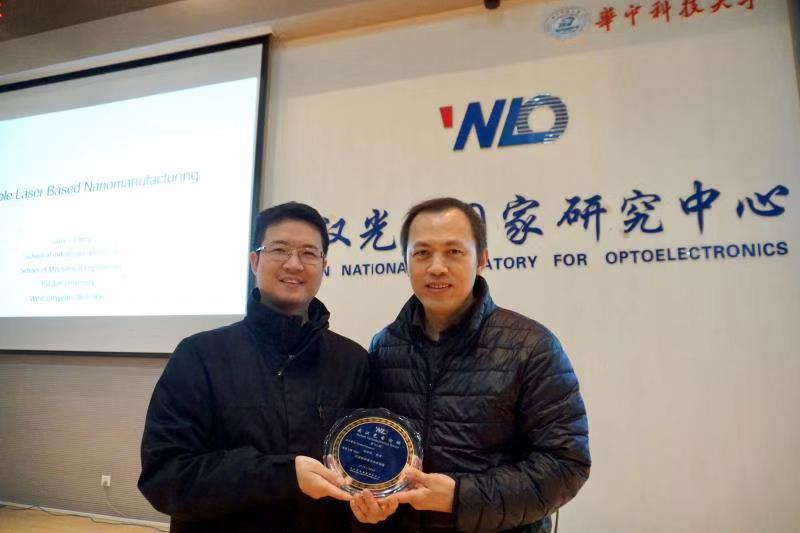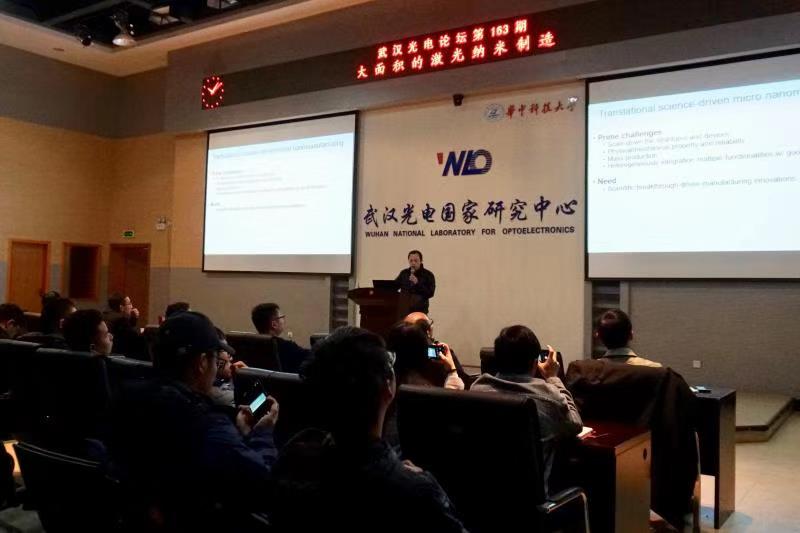WUHAN, China (November 27, 2019) - Wuhan Optoelectronics Forum No. 163 was successfully held in Auditorium A101 at Wuhan National Laboratory for Optoelectronics (WNLO) in the morning of November 27. Prof. Gary J. Cheng from Perdue University delivered an exciting talk entitled Scalable Laser-based Nanomanufacturing. Prof. Wei Chen, from Wuhan National Laboratory for Optoelectronics chaired the forum, and awarded Prof. Gary J. Cheng the forum medal.

Prof. Gary J. Cheng introduced the overall plan of his lab at first, and then introduced their works from four aspects, including integrating nanomaterials into structural materials, researches about functional materials, 3D printing for large-scale integration of nanomaterials and their applications in functional materials, laser for the design and fabrication of next generation integrated circuits. Prof. Gary J. Cheng stressed that many scientific problems have blocked the development of materials engineering, including large-scale fabrication, precise control of mechanical and physical properties, functional design and interaction control for devices, defect control of materials, etc., which are challenging for current existing manufacturing methods. Adopting laser shocking process, which is the main research approach of Prof. Gary J. Cheng, may solve these problems.
The first part was about nanomanufacturing of traditional metals, some figure of merits of traditional metals are hard to meet the demand of applications, which requires more understanding in structure of nanocrystals and their interactions. Laser treatment with controlled nanocrystal size, density and interactions provides an effective way for surface strengthening. 3D printing of nanomaterials into metals with the assistance of graphene is also able to enhance the hardness and Fatigue strength, release the remnant strain. Besides, ultrafast laser with strong force field can realize nano-imprinting of hard materials for better structural functionalities beyond the reach of traditional manufacturing methods.
In the second part, Prof. Gary J. Cheng introduced the modulation of materials properties based on laser shock imprinting, especially in the field of novel 2D materials. Laser is able to control the imprinting angle and depth of structures, quantum dots and nanowire structures. The strong force field of laser can be applied for researches into phase transition and pre-stretching for functional devices. In addition, laser shocking can generate more novel characters, including kink bands in 2D materials for mechanical analysis, large bandgap opening in graphene, superhydrophobic imprinting, etc. The interlayer gaps between 0D, 1D and 2D materials can be narrower after laser shocking to realize stronger coupling for large scale device manufacturing. Laser shocking is also applicable for controllable materials growth, Prof. Gary J. Cheng introduced their recent works about perovskites and MOFs. These works also proved the realization of excellent functionalities based on laser shocking imprinting for future applications.
Then Prof. Gary J. Cheng also introduced the applications of laser for 3D printing, fabrication of nanostructures based on ultrahigh force field, and synthesis of magnetic materials. At last, the wide prospects of laser for the design and manufacturing of next generation integrated circuits with large scale, nano sizes and 3D structures was also introduced. The application of laser for incision and weld is also promising to break the limitations of traditional methods.
Prof. Cheng graduated from USTB in 1993 with a bachelor's degree in materials science and engineering and from USTB in1996 with a master's degree in materials science and engineering. He received his PhD in mechanical engineering from Columbia University in 2002. Since 2003, he has been an assistant, associate and full professor at Washington State University, the University of Houston and Purdue University, respectively. In 2011, he was admitted into Purdue University's innovation hall of fame and selected as University Faculty Scholar. He has been awarded by NSF CAREER program, ONR Yong investigator Progream, AMSE YoungInvestigator, SME Outstanding Young Engineer, National Research Council Senior Research Associate Program. Prof. Cheng has a remarkable accomplishment in the field of advanced manufacturing engineering, research interests including in: using laser manufacturing to realize advanced materials synthesisand processing, especially in large-scale manufacturing metal micro-nano structure, the thermal deformation/phase transition, and the mechanics of materials induced by physical performance, mainly implemented in energy conversion, storage and loading and transport, biological medicine, electronic and optoelectronic devices, etc. Aiming at the aviation structural materials, functional nanomaterials, thin film materials and two-dimensional materials, Prof. Cheng studies the basic principles between the multi-dimensional geometric structure/micro-nano structure of materials and the physical properties of materials by using large-size laser processing technology. In addition, the basic mechanism of the interaction between laser and matter is also studied, and the unique structure of the material is realized by laser processing, and its mechanical, physical and photoelectric characteristics are also studied. Prof. Cheng has already published more than 200 academic papers and 5 academic monographs.
